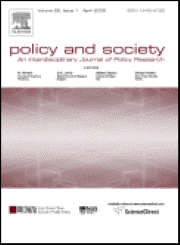 The question of the democratizing and legitimizing potential of civil society beyond the state is approached from different vantage points, indicating competing conceptions of European civil society that draw on deliberative, participatory or representative democratic norms. It is argued that the EU’s constitutional experience has sharpened the ambivalence between top-down activating or ‘partnership’ approaches vs. bottom-up mobilizing or ‘social constituency’ approaches to the construction of European civil society.
The question of the democratizing and legitimizing potential of civil society beyond the state is approached from different vantage points, indicating competing conceptions of European civil society that draw on deliberative, participatory or representative democratic norms. It is argued that the EU’s constitutional experience has sharpened the ambivalence between top-down activating or ‘partnership’ approaches vs. bottom-up mobilizing or ‘social constituency’ approaches to the construction of European civil society.
This special issue brings together contributions aimed at mapping as well as further developing the current state of the art in civil society research in interdisciplinary conceptual, normative, and empirical terms. Placing post-1989 European ‘real’ and discursive developments of civil societies in a historical and global perspective, the contributors observe general trends but also a range of regional European specificities in the three strands of social science research that are represented.
A first group of articles is primarily concerned with grouping and evaluating existing conceptions of civil society as they are related to the EU. Beate Kohler-Koch and Christine Quittkat reveal that two independent conceptions of civil society exist. One sees civil society as composed of stakeholder organisations articulating and representing the interests of their constituents, the other locates civil society in the sphere of social interaction. Klaus Eder opens the horizon beyond normative debates on what should count as civil society and who is to be identified as being part of the civil society and relates civil society actors and performances to the social sites where normative claims are produced and multiplied. A similar approach is defended by Hans-Jörg Trenz, who brings in a novel notion of ‘(civil) society’ as a discursive field for making claims of representation and legitimacy. He shifts the attention from ‘civil society’ as the intermediary realm of activated citizenship, voice and participation to the ‘social constituency’ as the latent structure, image and identity.
A second block of articles investigates the potential democratic virtues and roles of civil society in the EU. The EU-style of governance with civil society is scrutinized by Beate Kohler-Koch, who highlights the volatile use of civil society in the European reform debate and presents an analytical model of expanding EU-society relations. Stijn Smismans argues that the notion of European citizenship has often been conceived of in terms of rights and belonging rather than as a participatory status, whereas European civil society has been mainly conceived of through organised stakeholders but not through active citizens.
A third group of articles links role descriptions of European civil society to unfolding civil or uncivil practices within the wider process of transformation of the European order. Ulrike Liebert argues that contentious civil society offers an opportunity structure for information and reasoned communication that provides citizens with alternatives to withdrawal and political leaders with feedback. Finally, Carlo Ruzza analyses the manifestations of ‘uncivil society’ in Europe and the reasons for its emergence. With particular reference to the extreme right, Ruzza examines the relationship between political systems and civil societies, identifying factors that have made civil society relevant for political actors.
As the contributions to this special issue demonstrate, European civil society studies proved new insights for unravelling the puzzles of civil societies and the dilemmas of institutionalisation they face in the context of globalisation, state transformation and governance beyond the nation state. Summarising the contributions, the editors argue that in the enlarged EU, the normative foundations and political functions of civil society have undergone profound changes that have generated new problems and questions, but that have also driven the search for conceptual and theoretical innovations.
Some of the articles in this special issue are revised and peer-reviewed versions of chapters published in RECON Report 5.
Full info
New approaches to civil society in Europe
Special Issue of Policy and Society, Vol. 28, No. 1, pp. 1-98, 2009
Ulrike Liebert and Hans-Jörg Trenz (eds)